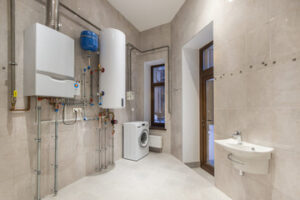Unlike traditional tank water heaters, tankless units heat only the water as it flows through your pipes. This allows them to provide on-demand hot water and save energy.
Depending on the size of your household, you may want to install multiple point-of-use tankless units to meet your hot water demands. Listed below are some of the key benefits of choosing a tankless water heater for your home. For more information, contact Denver Tankless Water Heater.
Unlike tank water heaters, which store hot water and use energy constantly to heat it, tankless systems only heat water when you need it. As soon as the tap is turned on, cold water travels through a pipe into the heater and then passes over coils heated with gas or electricity. The system is programmed to warm the water until it reaches your desired temperature and then shuts off. It only uses energy when you need it, not while it’s heating or reheating, making it up to 22 percent more efficient than gas-fired storage tank models in tests conducted by Consumer Reports.
Electric tankless units can be powered by either natural or propane gas and can also be connected to solar panels to make even greater energy savings. Since a tankless system does not store hot water, it is not affected by power outages or other issues that affect traditional water heaters. Natural gas and propane tankless units, however, depend on a fuel line that can be disrupted by utility or weather-related problems.
A professional can help you choose the right model based on your home’s energy needs. You’ll need to determine the total BTU output required for your household and know how much water each sink, shower or tub consumes in terms of flow rate and temperature rise. A professional can also advise you on how to get the most out of your new system by ensuring it’s properly sized for your household.
The type of tankless water heater you choose will also influence its efficiency. You’ll need to decide whether you want a point-of-use or whole-house unit, with the former installed close to where it will supply the hot water and the latter providing hot water for your entire home. You may also want to consider a condensing or non-condensing model, with the former maximizing energy efficiency by using a dual heat exchanger and the latter focusing on lower upfront costs.
Regardless of the type you purchase, it’s important to calculate the initial startup costs of your new system. Then subtract your monthly savings to see how long it takes for the investment to be recouped, which is often referred to as the payback period.
Space Saving
If you have experienced a lot of disorganized water clutter in your house, including dishes piling up along the sink and countertop as well as lukewarm or even cold showers, it might be time to switch to a tankless model. A tankless water heater will provide endless hot water without any of the inconvenience of waiting for a cycle to finish.
Tankless models are more compact than traditional tanks, making them easier to fit in tight spots and free up more space in your home. Most of them can be wall-mounted, which also gives you more options for room layout.
Because a tankless model only heats water on demand, it uses much less energy than the older tank style. This is because tankless units have much higher thermal efficiencies, meaning they convert more of the gas into usable hot water than their tank-style counterparts.
They also have a lower standby energy consumption, as they only turn on when a faucet is activated. The average household typically only uses 41 gallons of water per day, which means that a tankless model can save a family of four between $95 and $1,800 a year on their gas bill.
The longer lifespan of a tankless water heater also makes it a more cost-effective long-term investment. Tankless varieties can last 20 years or more, which is considerably more than the 10 to 15 year useful life of a storage tank type.
If you’re ready to make the switch to a tankless water heater, it’s important to do your research to understand how they work and their benefits. It’s also a good idea to compare your options before deciding which one is right for you.
With the right information and proper installation, you can enjoy the many perks of a tankless water heater. Contact TR Miller Heating, Cooling & Plumbing today to get started. We’ll help you find the perfect model for your home and install it in no time. And don’t forget to ask about our hot water heater rental program, which offers a great way to save money on a new tankless unit and reduce your monthly bills!
Flexibility
If you’ve ever experienced the frustration of running out of hot water, you may want to consider upgrading your home’s water heater to a tankless model. These units take up less space, save energy and eliminate the problem of running out of hot water altogether. They also have a long lifespan, and last up to four times longer than tanks.
The process is simple: a pump draws cold water into the unit, which then passes over a set of highly efficient and robust coils that are heated by gas or electricity. This heats the incoming water until it reaches an optimal temperature for use, and then the system shuts off until more hot water is needed. The end result is endless, on-demand, high-quality hot water that can be used at any time.
When deciding whether or not to install a tankless water heater, you’ll first need to consider how many different faucets or appliances will be connected to the system at any given time. You’ll need to know the approximate flow rate of each output so that you can ensure the heater is appropriately sized to meet your needs.
It’s also important to decide whether you’d prefer a whole-house model or one that serves multiple points of consumption. If your family is using a lot of water simultaneously, a point-of-use model would be a good choice. This allows you to place the heater where it is most convenient, and gives you more control over how each fixture or appliance operates.
Regardless of which type of water heater you choose, it’s best to consult with an expert plumber for proper installation. A plumber can help you understand the benefits and drawbacks of each model, and recommend a model that will suit your household’s unique needs.
A qualified professional can also provide you with a free estimate. This will allow you to weigh the cost against the benefits of a tankless water heater, and help you avoid any unpleasant surprises down the road. It’s always a good idea to compare different models before making any major purchases.
Maintenance
Although tankless water heaters are much more efficient than traditional models, they do require regular maintenance to ensure proper performance. This includes flushing the system to remove mineral deposits, which can reduce the efficiency of your unit and cause clogs in water lines. A professional can help to ensure your system is clean and working properly.
Another important step in tankless water heater maintenance is cleaning the system’s air filter on a routine basis. This can be done by removing the filter and using soapy water to scrub it clean, or by wiping it down with a soft cloth. The water heater’s user manual should specify how often this is required, but a general rule of thumb is every four to six months.
Many people also choose to have their tankless water heaters professionally cleaned on a regular basis. This can help to keep the unit running efficiently and prevent damage caused by water leaking or other issues.
A professional can also help to install a new venting system for your tankless water heater if necessary. A new vent pipe will connect to the flange and be routed through the wall to point outside. It will then connect to the vent hood, which should be sealed and caulked to ensure it doesn’t leak. The hood can also be attached to the exterior of your home to prevent it from becoming an eyesore.
Regardless of how you take care of your tankless water heater, it’s essential that you call a professional whenever there are problems. Any sign of a leak, strange noises or unusual energy bills should be immediately addressed by a qualified technician. Choosing a technician who has experience with tankless water heaters can help you to get the most out of your system and reduce the need for costly repairs or replacements down the road. Contact Grove Heating & Cooling today to discuss your options for a tankless water heater installation. We’re always happy to answer your questions and provide expert advice. We’re proud to offer quality plumbing services throughout the area, including water heater installation and repairs.


